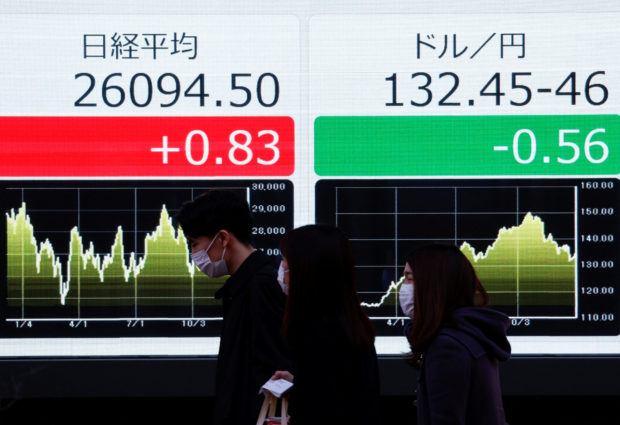Yen flying as market challenges BOJ, stocks cheer inflation’s retreat

Passersby walk past electric monitors displaying Japan’s Nikkei share average and the exchange rate between the Japanese yen against the U.S. dollar outside a brokerage in Tokyo, Japan, Dec 30, 2022. REUTERS/Issei Kato
SINGAPORE/TOKYO -Asian stocks rose on Friday as investors cheered a slowdown in U.S. inflation, while the yen hit a seven-month high and Japanese bond yields broke above the central bank’s target as markets challenged Tokyo’s commitment to loose monetary policy.
MSCI’s broadest index of Asia-Pacific shares outside Japan rose 0.8 percent to hit a new seven-month high and were headed for a third consecutive week of gains.
Japan’s Nikkei fell 0.4 percent and the yen, which surged 2.7 percent against the dollar overnight, kept going and rose about 0.2 percent further to 128.65 per dollar. It is up 6 percent in little more than three weeks since the Bank of Japan stunned markets by widening the band around its 10-year bond yield target.
A newspaper report flagging the possibility of more flexibility has redoubled bets on a coming shift out of ultra-easy policy that seeks to pin yields near zero.
The yield on 10-year Japanese government bonds breached its new cap of 0.5 percent on Friday morning trade at 0.53 percent. The BOJ was making unscheduled bond purchases in response.
“The market is expecting at the next meeting that they will increase the band for the 10-year again,” said Naka Matsuzawa, chief Japan macro strategist at Nomura, referring to the central bank’s upcoming meeting running 17-18 January.
“I think it’s too early for the BOJ to give up,” he added. “It still has ammunition to defend the 0.5 percent yield cap.”
The BOJ had described its December move as aimed at addressing distortions in the bond market, and defended the new target with bond purchases – but that is under immense pressure now as traders have a sniff of a shift at next weeks’ meeting.
“No change in policy this month would be a setback for the yen,” said Rabobank FX strategist Jane Foley. “However, we would look to buy the yen against the dollar on dips on anticipation of another (policy) move … in the spring.”
The BOJ will likely raise its inflation forecasts next week and debate whether further steps are needed, sources familiar with the bank’s thinking told Reuters.
Inflation in retreat
Beyond Japan, market sentiment was dominated by overnight U.S. December inflation data that landed more or less on consensus expectations. The annual pace of headline consumer price rises slowed to 6.5 percent in December from 7.1 percent in November.
Investors responded by down-shifting expectations for U.S. interest rates. A Federal Reserve hike of 25 basis points rather than 50 next month is now nearly universally expected, and futures markets have priced in several rate cuts this year.
The dollar slipped broadly, U.S. treasuries rallied and assets seen as risky, such as stocks and cryptocurrencies, rose.
The Nasdaq hit a one-month high. The U.S. dollar dropped 0.9 percent to a nine-month low of $1.0868 per euro and the risk-sensitive Australian dollar rose to a roughly five-month high at $0.6984.
Bitcoin surged 5 percent to break above $19,000. But some analysts struck a note of caution since services inflation remains sticky and because Fed policymakers are talking only of a slowdown in hikes in the offing, not a pivot to cuts.
“Market relief is grounded on solidifying evidence of dis-inflation squaring with the Fed approaching the end of its tightening cycle,” said Vishnu Varathan, head of economics at Mizuho Bank in Singapore.
“But the layers of inflation suggest that markets may be overly optimistic about ‘pivot’.”
Oil extended gains overnight – helped, too, by optimism about China’s reopening – and Brent crude futures were broadly steady at $83.82 in Asia morning trade.
South Korea’s central bank raised its policy interest rate by 25 basis points on Friday, as expected, and economists now think it might have reached the end of its hiking cycle.